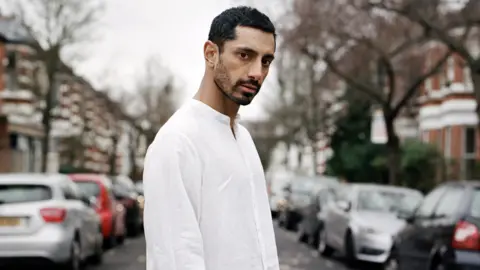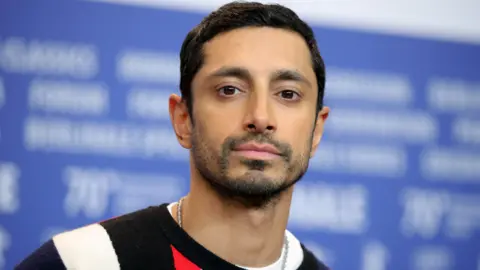Riz Ahmed on The Long Goodbye: Why he says 'Britain's broken up with me'
 Getty Images
Getty ImagesRiz Ahmed, the London-born, Emmy-winning star of Rogue One and The Night Of, has made an album, short film and live show about being dumped by an abusive lover - his home country.
"Britain's broken up with me."
The pain in the album's opening lyric gives a big emotional jolt before the music has even begun.
The first song, titled The Breakup (Shikwa), is delivered from the perspective of a person and a people who are so let down that they feel like their own country has ditched them. It only gets more pained and painful as it goes on.
That the person delivering it is Riz Ahmed - the Wembley boy with Pakistani roots who is now a Hollywood star - makes this break-up all the more heartbreaking.
 Getty Images
Getty ImagesHe says the album is "an emotional exploration" from someone "who finds themselves on the front line of this new, traumatised, confusing reality".
The press release bills The Long Goodbye as an album about the end of a "toxic, abusive relationship". At times Ahmed raps as himself; at others he seems to be speaking up for British-Asians more widely, the Indian subcontinent and the British Empire.
He stresses that, to him, the album's not political - it's all deeply personal. "I want people to know what this feels like. People who haven't really maybe understood how it feels, I want [them] to step into this feeling of heartbreak that a lot of us feel right now."
'Breaches of trust'
The 37-year-old made his name on screen in Chris Morris's 2010 terrorism satire Four Lions, before starring in Nightcrawler, Jason Bourne, Rogue One: A Star Wars Story and Venom. On TV, he won an Emmy in 2017 for HBO's The Night Of.
Meanwhile, he has had a parallel music career, using his sharp lyrical wit as Riz MC and part of the Swet Shop Boys, often to tackle his conflicted cultural identity and his experiences of racial stereotyping.
But the wound that's laid bare on The Long Goodbye goes deeper.
 Sharif Hamza
Sharif HamzaWhen was he dumped? "I don't know if we've really fully broken up. I just know that it's complicated," Ahmed replies.
"A lot of people are feeling like the terms of the relationship are changing, or that we're somehow reneging on the vows that we exchanged. Like any relationship, I don't know if there's a specific moment where things all fell apart, or if there's an accumulation of small breaches of trust that get you to this point."
In a 2016 interview, he said he used to describe himself as British-Pakistani, but had come to realise that the word British on its own could encompass all identities.
'Rising xenophobia'
Where You From, one track on the new album, dispenses with the relationship metaphor to give a complicated answer to the simple question in the title.
Does he feel the word British still suffices? "Of course I describe myself as British," he replies. "If I'm not British, who is?
"I guess I feel that, in the midst of kind of rising xenophobia or a narrowing of people's minds around what Britishness can look like or sound like or taste like, it's all the more important for those of us with complex identities to stand up and defiantly and triumphantly declare ourselves as British."
At another point in our interview, he stresses: "This isn't me coming out and telling the world I'm no longer British and I've got nothing to do with Britain."
 Getty Images
Getty ImagesThe album, he explains, is a way to "explore all the emotions - often conflicting emotions, quite contradictory feelings, quite ambivalent, nuanced thoughts - through poetry and art and spoken word and singing".
What is his experience of being "on the front line" of the "new reality"?
"It's very clear isn't it? Hate crime is spiking across the world," he replies.
He also talks about the treatment of minorities in India or China, and in European countries where the far right is on the rise.
"It's very clear that the reality we're in is one of a lot of people feeling unwanted and feeling upset about that and scared about that. So, I think it's just a reaction to that."
Celebrity cameos
As it continues, the album travels through the stages of a bitter break-up - denial, anger, depression, acceptance and, finally, getting back on your feet.
Between songs, we hear voicemail messages from the likes of Oscar winner Mahershala Ali ("Don't let her hate for you turn into self-hate"), comedian Asim Chaudhry - in character as Chabuddy G ("We're going to get over this chick") - and even Ahmed's own mum ("Hold your head high and leave with some dignity intact").
Ahmed says he wants to work things out. "Looking back across this relationship, even if it is a dysfunctional one, it's still one that in one way or another we have to make work. We bought a house together. We've got kids together. So let's find a way of making this work like adults."
He adds: "And actually sometimes relationships can come out a lot better for having gone through these kind of speed bumps.
"So even though it is a break-up album, it ends very much in a note of hope and empowerment."
 Film Frame/Lucasfilm Ltd/Kobal/Shutterstock
Film Frame/Lucasfilm Ltd/Kobal/ShutterstockFrom the pain and anger that are evident at the start, it now sounds like he's trying to put a brave face on the split.
"Honestly, I'm not trying to put a brave face on anything," he responds, adding that he is currently in the process of "unmasking my true, fully complex identity for people to like or lump".
That is why The Long Goodbye is his first to be released under his real name.
"But in terms of where this album's come from, you're absolutely bang on, yeah. It absolutely has come from a very personal place. There is some real pain in this. There is some real anger in this, just as there would be in a romantic relationship."
He will perform the songs in a special theatrical show staged by the team behind the Manchester International Festival at the end of March, and in New York in April.
 Getty Images
Getty ImagesSome of the tracks also feature in his latest feature film, Mogul Mowgli, which has just won an award at the Berlin Film Festival, while Ahmed has also made a separate accompanying short film. It delivers an even bigger jolt than the album.
In it, a British Asian family are preparing for a wedding when they are rounded up by state forces wearing balaclavas and St George's crosses as white neighbours watch from behind twitching curtains - with clear echoes of the treatment of Jews in Germany in World War Two.
Ahmed says he wants it to "ask questions" of the audience. The first question is: Surely that couldn't happen here. Could it?
"I guess my first responsibility as an artist is to show the inside of my mind, to show you the things that keep me up at night, whether they're hopes and dreams or nightmares and fears, or sometimes a combination, and to kind of spill that out there," he says.
"Absolutely, again, that place of creation has been shaped by world events. The story in the short film is one that I've certainly heard many people worry about how close that kind of thing is.
"And having just come back from Berlin Film Festival, it's, you know, all too recent. It happened in Europe within a lifetime, within my lifetime in Bosnia, happening today in India, happening around the world, sadly.
"I wasn't trying to make a polemical film, but very much trying to just show the inside of my brain and wear my heart on my sleeve a little bit."
The film feels like too much to contemplate. But the fact he has even contemplated it is too much.
Please, Riz, can we give this relationship another shot?
The Long Goodbye is released on Friday, 6 March. He plays at Mayfield Arch 6 in Manchester from 26-28 March.

Follow us on Facebook, or on Twitter @BBCNewsEnts. If you have a story suggestion email [email protected].
